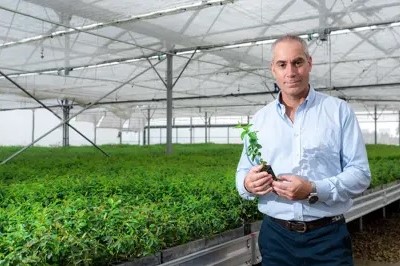 Eucalyptus expertise
Eucalyptus expertise
UPM’s new forestry research centre in Paysandú, Uruguay, is focused on developing the best possible genetic materials for tree plantations. R&D has a crucial role in supporting operations as the company prepares to more than double its production of eucalyptus pulp.UPM’s first forestry research centre specialising in eucalyptus plantations was inaugurated in May 2022, bringing together more than 30 years of the company’s accumulated knowledge.
According to Ricardo Methol, Senior Manager, Technical Development & Planning at UPM Uruguay, the work originates in the early 90s, when the focus was on testing and selecting such species of eucalyptus trees that could adapt well to local growing conditions.
“There are over 500 species in the eucalyptus genus and we chose two of them that provide the best performance – Eucalyptus grandis and E. dunnii – as the main species to be planted in Uruguay. At the time, the dunnii species was not at all well known in Uruguay nor in the pulp industry globally, but now it is the most planted eucalyptus species in the country,” Methol says.
Over the decades, UPM has worked on improving the genetic material of the trees to achieve better productivity. An important step was taken in the year 2000 when the company began to propagate its trees from cuttings instead of just from seeds.
“This so-called cloning or vegetative propagation enables us to replicate exactly the same genotype of selected trees hundreds of millions of times. It helps to make the plantations more productive and uniform and provides efficiency for the entire operation, including harvesting and wood transport,” Methol points out.
R&D affects entire value chain
The new centre employs around 60 people, including agronomists, experts in genetic improvement, health, forestry research and wood quality, as well as chemical technologists and operators. High productivity, wood quality and good tolerance to pests and diseases are the current focus areas of the centre’s research work. Methol adds that speeding up the entire process is also a key target.
“We are, of course, always looking to make improvements to the characteristics of the trees and increasing the efficiency and accuracy of identifying the best candidate clones is crucial for that. Also, testing new candidates against harsh environmental conditions caused by climate change such as frost and drought has become more important.”
Methol reminds us of the fact that, before a tree clone is confirmed for operational use, it takes around 15 years of testing hundreds of candidates, out of which only one or two are selected. This requires a lot of resources for testing, trials and evaluation. The laboratories, equipment and greenhouses of the new research centre provide UPM’s skilled experts with a state-of-the-art infrastructure.
“Also, with the inauguration of our new pulp mill in Paso de los Toros and third tree nursery in Sarandí del Yí, the scope of our work more than doubles, so the new centre provides a necessary boost. R&D is strategically critical for the company, as we are not only looking at optimising forestry operations but also selecting materials with the best characteristics for pulp production and fibre properties for customers,” Methol notes.
Enhanced analytic capacity
Methol says that since the new research centre was inaugurated, work has mainly focused on finetuning the equipment and especially calibrating the small nurseries where seedlings are produced for trials and new clones scaled up for production.
“Each year we start a new 15-year pipeline by entering selected trees into the process. This year we were able to almost triple the amount of wood samples analysed in the initial phase, which increases our opportunities for identifying outstanding trees.”
The new centre is one of the top facilities worldwide in its field and, according to Methol, UPM is a global pioneer especially in research related to Eucalyptus dunnii.
“Obtaining cuttings from that species is difficult because of its intrinsically low rooting rate, so there are only a few facilities in the world that have mastered its propagation from cuttings on an operational level.”
Supporting cooperation
In collaboration with universities and research institutions, the centre is also part of several research streams related to the sustainability of eucalyptus production. Studying water usage on plantations has been ongoing for over 20 years and monitoring the effects of plantations on the soil compared to land use for cattle grazing has continued for more than a decade. Also, as part of UPM’s biodiversity programme, biological surveys have been carried out since the early 1990s to help identify, classify and protect species and native ecosystems.
Besides providing resources for collaborative research projects, the new facility will have a positive effect on forest producers associated with UPM’s Fomento Programme, which allows landowners the possibility to diversify their traditional production activities such as cattle raising and agriculture with forestry through sustainable eucalyptus production.
“We are now even better positioned to provide our partners with the latest technical advice and best possible seedlings for their plantations,” Methol concludes.
Text: Timo Nykänen
